- coming of age
- identity and growth
- the title “paper bullets” + fictional autobiography
-> bullets intend to hurt/feel/overpower
-> origami + paper bullets
-> is this fiction? is it real? does it even matter?? - dedication: “for the way she makes me feel” – who is she?
-> “the way you make me feel” by MJ - so many pop culture refs in this book
- preface: “occasionally in this text i’ve had to modify the truth a bit. please forgive me. i did it for you”
-> deliberately stretching the truth to reach a higher truth
samurai champloo does this -> “all of this is fictional, so shut up and enjoy the show” - intro – what is “it”?
-> life, pop culture, media
-> “blessed or cursed, i remember everything” ; “my every recollection filled with random names and phrases” - 1970’s – the ME decade
-> significant bc of main character’s transition from me->world - chapters all named after flowers + each flower has a meaning to it
-> ex. sunflower=familial + pure love, daffodil=misfortune (1 flower)
-> all annual flowers - “sometimes in life, i think we’re supposed to drown a bit. sometimes, maybe a little more”
- the meaning of FOB and assimilation -> conflict between FOBs and ABCs
-> more pressure from ABCs to assimilate to american culture than anyone else
“don’t ruin this image i’ve constructed” -> insecurity - home, family, belonging
- parent/child relationships
-> do our parents ever think ahead before having us?
seminar notes on Paper Bullets
Birth of the Dragon (2017) film notes
- white director
- inaccurate portrayal of bruce lee
-> shown as a cocky asshole who just wants to fight
-> idolization issues – were they really trying to make out bruce lee to be a bad guy, or were they just writing him as a human? - typical hollywood movie imo
- pays homage to kung fu/bruce lee/buddy cop movies w/ it’s style choices
-> replicates those film’s formulas - focuses on the white main character instead of bruce lee or wong jack man
-> isn’t this movie supposed to be about bruce???? - basically a fanfiction-made-movie
- humility vs. pride, traditional vs. “modern”
- lack of depth to the characters
- bruce lee and the 1960’s – cultural revolution era
Kumu Hina (2014) film notes
- this is the second time i’ve seen this!! 🙂
- mahu -> third gender (hawaiian)
- hina wong-kalu -> hula teacher at lahau lokahi
- colonization fucked up hawaii’s aloha
-> US missionaries condemned hula + other practices
-> “after 200 years of colonization… we are still here” - “there’s nothing wahine about my voice” -> hina teaching the boys how to chant with strong voices
- kanaka maoli (native hawaiian)
- kumu + her student are both “in the middle”
- met her (ex) husband on tonga
-> she can translate lots of different islander languages - struggling with passing (as a woman)
-> “i’ve had this voice my entire life… i’m both… sucks to be a mahu sometimes” - hina’s ex – “i’m starting to understand america. everything here is all about money”
- the fact that the students ar halau lokahi get to learn native hawaiian language and culture in school is such a privilege
-> don’t take that for granted, kids - hina identifying as mahu as authenticity + respect for family (same as heck)
- “all we want is… for someone to give us the aloha we seek”
- hina going on road trip with friend + husband to visit other mahu friends
- mahu from city vs. mahu from rural areas
hina’s perspective on not telling the students where they have to go gender-wise - hina monitoring diggings to prevent burial grounds from getting tampered with
- the end performance will always make me teary eyed
-> “she’s the kumu to us boys” you damn right!!!
discussion notes:
- informality and comfortableness
- preserving her culture through being herself, being mahu
-> transness outside of white culture - she felt like an auntie when she talked to us last year @ evergreen
- talking about transness is hard unless it’s in a cultural lens
-> not necessarily easier but more accessible that white trans issues - “racial paradise”
- complexity of race and multiracialness
- PI spaces vs. non-PI spaces and presenting differently in each space
- hina’s understanding of her culture as a strong presence
-> it’s not completely our faults that we don’t know our culture, it’s our elder’s faults for not teaching us - hina advocating for indigenous folks at the same time as PI folks
- not taking colonization into account when ppl say that POC are transphobic/homophobic
-> laws in other countries against LGBTQ+ folks as a result of colonlization - erasure of POC/indigenous trans ppl
- labels in other cultures/languages not always translatable
- transgender is an english word used as an umbrella term for people who don’t identify as girls/boys
-> trans people existed before the word trans was created
pasifika lecture notes
- polynesia, micronesia, melanesia
- purpose of this lecture: to bring awareness to an erased peoples
- oral traditions being a big reason why pasifika peoples aren’t well-known
- why did i join this program?
-> to learn more about myself and other asian/pi cultures
-> to increase my knowledge of history to share with the next generation - terisa siagatonu – “ethnic studies” (poem)
-> “when ethnics study ethnic studies, it is not school anymore” - this program is a privilege!!
- PI representation is rare, both PI and mixed PI
- debunking disney and other narratives
- moana – was it good representation?
-> imo: no, because they mushed all the cultures they could together
a good start but it’s not enough - 20+ different cultures included in maui’s “your welcome” song
- considering religions and cultures outside of catholicism as myth + legend as erasure and delegitimizing
-> esp. happens with PI cultures; seen as lying, “it was just a dream/a story” - the impact of representation affecting people’s perceptions of certain groups
- lilo and stitch -> disney has been selling her story for profit and making her narrative interchangeable
-> her design has changed depending on the animator, but stitch’s hasn’t
->stitch is profitable, but not lilo
-> running gag that gantu is samoan in the lilo and stitch cartoon series - these stories aren’t being told by their people, it’s all being done for profit
- tatu and the “bro” aesthetic
-> tatu as a right of passage + connection to family; sacred; can take hours or days to finish - disney’s discontinued maui costume as an example of tatu appropriation
- tatus in indigenous cultures were never meant to be sold
- ecotourism + globalization
- sports and other physical means as standard forms of success for PI’s
-> football, rugby, military, and other forms of entertainment + physical labor - colorism as categorization for success
- american samoa and guam as #1 recruitment centers for US military
-> complexity of being american territories + being a US national - “samoan soldier” (song)
-> appropriation of black culture + hip hop - using PI folks to fuel foreign military powers
-> islands being central for war; used for land, storing supplies, testing grounds for weapons, etc. - guam was bombed shortly after pearl harbor + then japan occupied them (after the US evacuated themselves) for 2 1/2 yrs
- this (colonization) isn’t history, it’s happening right now
- litekyan/ritidian
- “racial paradise” -> race+sex=???
-> fetishization of mixed people - “the discourse of aloha”
- many of the islands had matriarchs before colonization – now hypermasculinity + gender binary issues
- asian folks on the islands – “settlers, not immigrants”
lilo and moana (pt 2): disney and limited worldviews
it was ironic that i posted something about lilo and moana last week and that we discussed both of those movies in the pasifika lecture (that i will be posting notes on after this post!).
i feel like i didn’t touch enough on this in my last post, but as much as i love lilo and moana, and how much i can relate to their characters, i’ll never really be like them. i know that inherently because i don’t have the experience of a pacific islander person. it’s probably problematic to say that we even look alike, but i think that lies more in the hands of disney and the fact that that they’ve only made a handful of visibly brown main characters, especially brown girls.
disney sucks. i loved disney movies as a kid, and i still love them as an adult, but i wish disney would see that these stories they keep trying to make are really important, and trying to create an accurate portrayal of communities of color would benefit lots of people people. if they weren’t so focused on making money off of it all… (but then again, i don’t really have a lot of faith in disney or any big name company for ever making movies about folks of color that are accurate and involve POC as the main creators of the story). i don’t think representation can ever be completely perfect because everyone has different experiences in their cultures that can’t always be accounted for, but with the rise of diverse media coming up, there’s gonna need to be a lot conversations about representation and appropriation.
reflecting on my consumption of media like disney, coupled with me being american born-and-raised, i’m always so surprised by my own lack of knowledge about the world outside of the untied states, and outside of my own cultural knowledge. it feels like i know a lot one minute, and then i don’t really know anything the next. it’s sometimes a struggle, but i’m glad that my worldview keeps expanding and that i keep learning new things, because otherwise i’d be missing out on a lot of the stuff that exists outside of my american bubble. i’m thankful for having the opportunity to learn more, and i’m deeply appreciative of the presenters from this week for sharing their knowledge and lived experiences with us. i know i’ll be taking that place a lot with students and coworkers that i’ll be working with in the future.
the pasifika lecture reminded me that i have a lot of research to do for the future. i want to include as much history as i can into my classroom. i’m going to have to search all over the places for information and it’s going to exhaust the hell out of me, but it’ll be worth it for me and my students that they get the opportunity too see their histories being taught/can see themselves represented.
on cross-cultural connections: a guided meditation
lets set some things straight for everyone:
having a connection or
being able to relate to an experience
of a culture outside of your own
does not equate to being
part of said culture.
your partner is a person of color?
that’s beautiful. congratulations!
what’s not is when you take
all of the parts
of their culture that you fancy
and claim them to be your own.
are you a person of color? no?
then you aren’t a person of color,
and you can’t get that quirky tribal tattoo that
you found on google,
because it doesn’t belong to you.
simple, right?
you aren’t an
honorary person of color
just because you’re dating one,
or because your best friend is 1/38 mexican,
or you know a chinese person who says it’s okay
to say the word chink,
or the one black person you’ve
ever met
says that they think it’s okay for
white people to have dreads.
white people do this thing where
once they find something and like it,
they think it automatically belongs to them.
imagine being in elementary school
and you’re on the playground
playing with one of your favorite toys,
but some kid decides that they like
your toy
and take it from you without asking,
and you run to tell someone about it
and they say,
“but that toy could belong to anyone!
i don’t understand why you’re getting so upset
over a toy.”
that’s what appropriation feels like.
it’s even more complex than that,
because this form of entitlement to space
has been in place for so many years
that it’s just natural for y’all now.
this happens among groups of color, too
like, don’t get me wrong,
we aren’t perfect.
there are a lot of complex conversations that need to
happen among communities of color
in terms of appropriation and
power and privilege.
but the power difference
is so extreme when the appropriation
comes from white people.
so before you try to make
that “authentic” rachel ray pho recipe
that you found online,
or wear that sombrero and moustache combo
on cinco de mayo,
maybe realize how much you taken
from others
and reflect on your history
and the privilege that came with it?
thanks
signed,
an exhausted brown person.
Mississippi Masala (1991) film notes
- rated R for “sensuality”
- all asian ppl getting forced out of Uganda
-> “africa is for africans. black africans” (true!!!)
->immigration + asian communities - as they leave “take whatever you want from the house”
- dad crying, doesn’t explain why they’re leaving to the daughter
- they all speak swahili
-> okelo saying goodbye to the family
-> did okelo and kinnu have a thing? mina has a different nose from jay - kinnu gets harassed by the guards on the bus
- kinnu hides mina’s face from the guards
-> is she mixed? - uganda->london->mississippi
- wow this girl is so pretty->it’s mina!
-> darker skin than her mother; speaks english fluently - “you’re gonna need to get that black guy’s name for the insurance” but she hit him???
- dad’s sad monologue about being forced out of uganda
- lots of discussions of class – the insurance, lawsuits, “he cleans my carpets”
- “harry’s mother doesn’t like darkies” -> colorism
- generational differences
- gossip at the indian party about class + color
-> “you can’t be dark and poor and expect to her harry patel!” how about fuck off - white guy calls the police on the party
- mina and harry leave to another party (american + black)
-> the mail guy she hit is here - she knows some of the folks here!
- harry looks uncomfortable lol
- mina and demetrius slow dance
- harry’s pissed and wants to leave but mina stays
- “are you mexican?” “no…. i’m indian”
- her family lives in a motel
- mina asks about okelo and jay, mom avoids it
- “like harry.” “no.”
- “your people are very good at sports, no?” indian guy to the black folks
-> why are we (non-black poc) like this - jay wants mina to go to college (classism)
- black person trying to serenade kinnu while jay isn’t there
- photo of mina and okelo brings up flashbacks of jay and okelo growing up
- “i’m a mix masala”
- mina goes with demetrius to his family’s dinner
- everyone asks mina about africa and india
- “i had to tell my parents i was seeing someone else”
-> oooooh they’re gonna get caught!
-> later: “leave our women alone!” - “african music”
- their relationship is so cute
- when they get caught the other indian guy calls the cops on them and they both go to court
- how is loving a black person shame on your family? ughhhh
- “i’ve worked hard to get where i am, i wanna see you work hard too!”
-> fuck off white guy - speaking in another language so demetrius can’t understand
- “you’ve caused us enough trouble!” – jay
-> “so you have a problem with me and mina?” – demetrius - “y’all can come from who-knows-where and be as dark as us, but as soon as you get here you start acting white”
- “i remember (okelo’s) face when he came to say goodbye, and you didn’t even look at him” – mina to jay
- “you’ve become american.” “so what? if you don’t like it, go back to india.”
- jay goes back to uganda
-> okelo passed away 🙁 - “home is where the heart is”
lilo and moana: brown girls on screen
as a kid, i only saw myself reflected in media a few times, and that was through dora the explorer, pocahontas, aladdin and lilo and stitch. there are some serious problems with at least two of these movies and my family associating baby me with these movies (for example, dressing me up as a native person in elementary school around thanksgiving time while all my white peers dressed up as pioneers/ all my poc peers as natives as well. gross. not to mention aladdin’s weird orientalist fantasy narrative), but despite me reflecting on the negative impacts of those movies on my early understanding of race, there was reasoning behind my family being so eager to have me consume this media—because the characters looked like me.
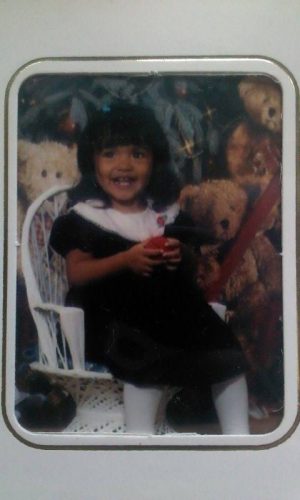
A photo of me as a baby. I have shoulder length dark brown hair with straight bangs, dark brown eyes, and tan skin. I am wearing a black and white dress while sitting in a white chair. I am staring at the camera with a big smile, mid laughter, while holding a red object in my hand.
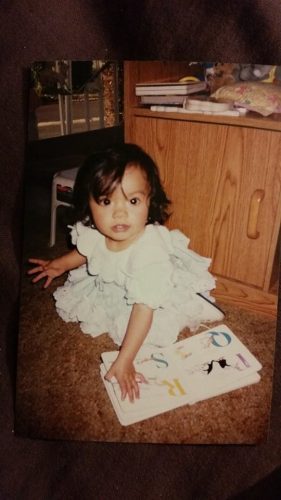
A photo of me as a baby. I have short hair with long bangs, with the ends of my hair flipping out away from my face. I am staring at the camera with a surprised expression. I am wearing a white dress and I’m sitting on my knees on the floor. There is a book in front of me that I was turning the page of when this photo was taken.
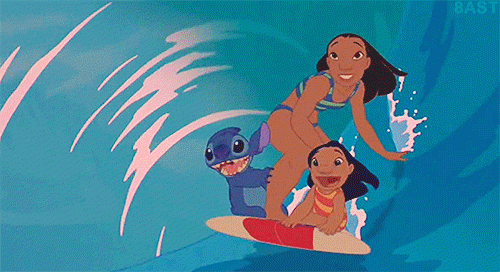
A photo from the Disney animated movie Lilo and Stitch. Lilo, Nani, her older sister and Stitch are all surfing together in the ocean with large smiles on their faces. Lilo and Nani are tan with dark hair, dark almond-shaped eyes and round noses. Stitch is a blue alien creature that they adopted as a dog from their local animal shelter; he looks a lot like a koala.
we watched lilo and stitch at my work place recently and while i watched lilo as she tried to approach the other girls in her hula class while they peddled away on their bikes, i remembered how much i loved that movie as a kid. the bubbly art style, the witty humor, the squabbling between sisters who are too stubborn to admit that they love each other, lilo’s quirkiness (ie. her love for her doll scrump and stitch) all reminded me of when i was in elementary school and watching the movie on VHS in my living room. i loved her character so much, because she reminded me so much of me.
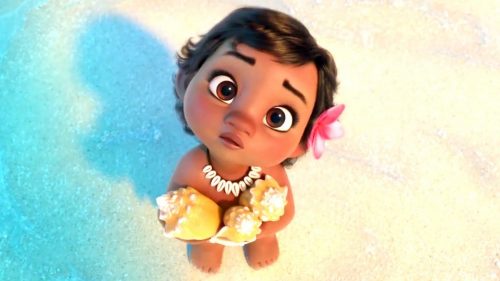
A photo from the Disney animated movie Moana. Baby Moana is staring at the audience with a concerned expression while holding shells in her arms. She is tan with deep brown eyes and hair, wearing a shell necklace around her neck and a flower in her short hair.
cassie as a kid would’ve also loved seeing moana. i almost broke down in tears a few times during the movie. when i first saw baby moana on screen, i couldn’t help but stare because she looked just like i did when i was born. same nose, same hair, it felt like i was her for a moment. not to mention her relationship with her grandmother! i had a really strong bond with my grandma, so when she was saying her last goodbyes to her, and later when the manta ray shows up in the ocean, i felt so overwhelmed with emotion.
although i am not pacific islander, these movies made me feel like i was home. i think these movies deserve as much praise as they do criticism, because there are definitely things that disney fucked up on, but the impact of seeing these characters on screen will always make me cry. i love them, and i hope more films come out with brown characters at the forefront (with the proper representation!!!) so that little kids can see themselves like how i got to through these beautiful girls.
as per usual, here’s another poem, though much shorter than my last couple of poems!
dora was one of my first friends.
dora was the first person i saw speaking spanish outside of my aunt patsy’s home and my neighborhood.
dora was the first girl i saw with brown skin and brown hair and brown eyes like me.
lilo was the first girl i saw who had my nose and my eyes on a child my age.
lilo was the first time i saw absent parents on screen.
lilo was the first time i saw the older sister acting as a parent, like my sister has to me.
lilo was the first person to teach me that dysfunctional families are more normal than people think.
moana as a baby looked so much like me as a baby, like, if i put a picture of myself as a baby you would think they had drawn me.
moana and her grandmother dancing next to the sea reminded me of home and my grandma’s loving embrace.
moana reminded me that i was a little brown girl, brown child, just like her once.
moana reminded me to look for home in the water.
moana reminded me that i have time to retrace my roots, i just have to look for the signs that lie in the stars.
on language and code switching
this week’s reading of wild meat and the bully burgers made me think a lot about how we use our words, especially in college settings. i’m thankful for the lack of restrictions in our blog posts, because in this space that is my blog i don’t have to conform to standard american english (SAE) and all the annoying conventions behind it. i can talk like i do (for the most part) in real life instead of this constructed vernacular of academic language that’s really hard to understand half of the time. in other words: blehhhhh, fuck english
english is my first language (unfortunately). my sister has an associates degree in english, so while i hate english and the lack of accessibility of academic language, i was taught at a really young age how to read and write in standard english. she grilled me on my vocabulary, my pronunciation, my grammar, and all those other tedious conventions really early in life. her teaching me all those things got me really high marks in reading and writing tests, so high that i was considered college-level in my elementary school years. i prided myself over my college-level comprehension skills in 5th grade. i thought i was so smart and good at reading and writing for years because of that rank, like no one could call my writing bad or point out any mistakes in my writing because obviously i was right all the time, i had college-level comprehension. once i actually hit college, though, i realized how arrogant younger me actually was. my writing is far from perfect, at least to college standards (and also to my own personal standards, but that’s just me being a perfectionist). it’s a lot easier for me to take criticism now about my writing, but i still feel like i should be living up to that college level ranking i got in 5th grade. it fucks up my perception of my own work, which is super not helpful for me and my anxiety.
i could empathize a lot with lovey during the second chapter of wild meat. from her frustration with understanding math to her struggling to speak when she was called on in class, i could see a lot of my younger self in her. we have different skills sets, with her speaking pigdin, but i and other students in the K-12 school systems have been stigmatized by our teachers for not meeting their standards, not automatically knowing everything that they expected us to know when we walked into their classrooms. it’s a big reason why i want to become a teacher myself, so that other students of color don’t have to be publicly shamed by their teachers who are supposed to be mentors and guide their students’ understandings, not berate them and force them to conform to one singular understanding of the world. i got really frustrated when their teacher told them not to speak in their native tongue ; just because their language is different from yours doesn’t mean they aren’t intelligent and as capable of learning as the other students in the room! we should be encouraging students to use what they already know and have at their disposal to increase their learning. if the language of music suits their learning best, let them do creative projects with different sounds; if they speak a language other than standard english, let them conduct their own projects using their native tongues, like putting on a cultural festival or teaching other students about themselves through speaking like they would at home. it’s much more effective to have students use the knowledge they already have to learn new things instead of enforcing one standard to learning that not even half of your students will be able to fully understand at the end of the day.
this should automatically apply to our program as well. there’s such a wide array of understandings and cultural backgrounds in our program that there will inevitably be language barriers and cultural conflict between each other. for example, it’s ridiculous of us to assume that each of us learned how to speak english as our first language. letting our classmates be able to use their first language without asking them to translate for us is important to think about—i have a feeling a lot of us will be using words or phrases from our cultures that would be exhausting to have to translate to english every time they pop up. we should take it upon ourselves if we don’t speak the same language or have the same understanding as another person in the room to let people do their own thing, and ideally learn from each others experiences and reflect on everything that we’ve been taught to know and believe.
short notes on The Beautiful Country (2005) film viewing
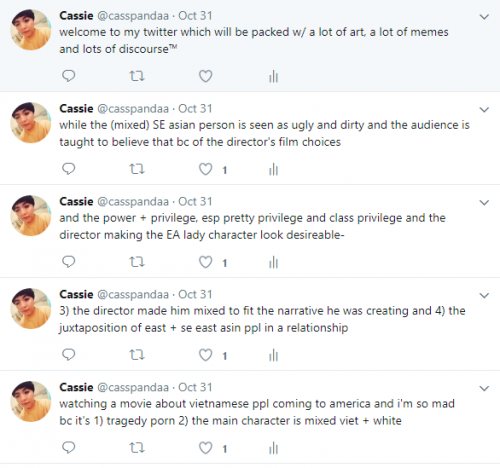
An image of my twitter account where I ranted about the movie we watched in class this week. The photo should be read from the bottom up.
